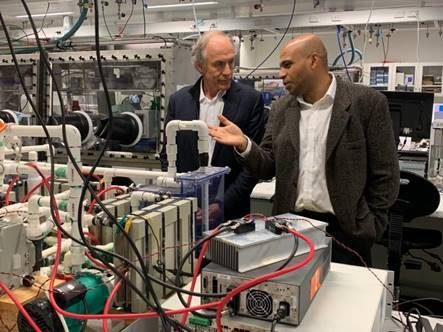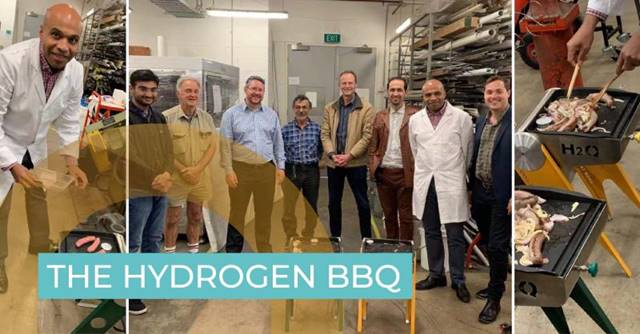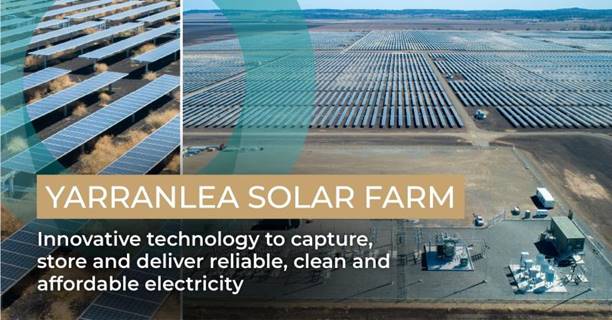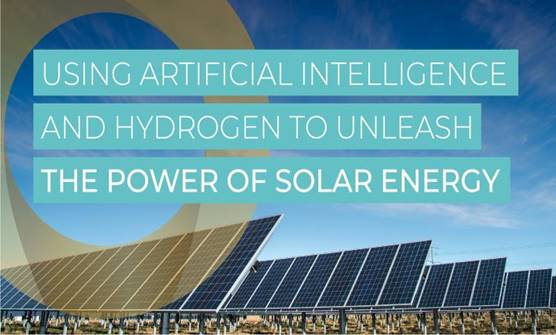CRC partner Providence Asset Group brings a wealth of expertise around smart technologies – including renewable energy for microgrids and world-first hydrogen technology for green-power storage – to the collective table, and is positioned to play a key role in powering smart, sustainable food precincts across Australia.
Australian-based investment company Providence Asset Group is focused on the future. And if this visionary firm delivers on its mission, we can look forward to a brighter, smarter and more sustainable tomorrow.
The company is committed to advancing what it calls the ‘green city life’ concept, promoting this via disciplined investment in projects and funds purposefully chosen to drive ‘long-term societal value’ along with attractive returns for investors.
Providence’s vision is to enable the creation of smart, sustainable future communities powered by clean, cost-saving renewable energy – communities in which water isn’t wasted, supply chains are efficient, and people live healthier lives helped by tailored nutritional and medicinal products.
To this end, the group invests heavily in the development of clean, cost-effective renewable technologies, collaborating with globally recognised research institutions, industry partners and professional teams “to open up the entire chain of investment, design, construction and project asset management in renewable-energy areas”.
“We work with world-leading research organisations like UNSW and UTS to utilise artificial intelligence, data science, quantum computing and blockchain,” notes Providence Director Alan Yu.
The group’s collaboration with global experts in cutting-edge technologies, he says, enables it to create future-focused communities underpinned by smart, sustainable credentials.
“We develop ‘smart’ communities based on smart energy, water and food, and the promotion of healthy lifestyles,” Yu says.
“Smart energy means optimising the renewable energy sector to become the core source of energy production. Smart water is about optimising the quality, production, storage and usage of water to support regional towns and cities in adapting to changing climatic conditions.
“When we talk about smart food, we’re looking at optimising the production, quality and transportation of Australian agriculture to deliver sustainable increases for domestic and international markets,” he says.
“And then promoting smart living is about things like the development of biomedical devices to mitigate the impacts of disease, improve treatments and promote healthy lifestyles.
“Together, these things help create what we call ‘smart communities’.
“So what we seek to do, essentially, is invest in projects that enable the integration of social, environmental and economic activities and trends to optimise the planning and operations of cities.”
As Providence’s success is aligned to the success of those clients, it takes its investments very seriously, focusing on long-term sustainable returns and taking a proactive approach to risk identification and mitigation.
Under its collaborative, innovation-driven investment strategy, the group helps to fund and manage an array of future-focused assets in renewable energy, clean technology, venture capital and eco-friendly real estate.
H2Store: World-first hydrogen storage technology
Providence has contributed significant investment funds to forward-leaning company H2Store to assist it in developing advanced hydrogen technology for storing renewable energy. The world-first technology works by increasing hydrogen’s volume density, allowing for cost-effective bulk transportation to end-users and export markets. H2Store’s technology is set to ‘revolutionise the energy industry’, enabling the development of low-pressure, intrinsically safe and non-toxic hydrogen storage products. Providence’s mission is ‘to be the first to market with commercial hydrogen storage solutions’.
And this mission, if accomplished, will bring immense environmental and economic benefits. According to Alan Finkel, Australia’s Chief Scientist, hydrogen’s time has come, with Japan committed to being a long-term, large-scale hydrogen customer – an expected 12 billion-dollar market, and similar demand anticipated from the Republic of Korea and China in coming years.
Smart city development: Tamworth Tomorrow project
Progressive Tamworth Regional Council (TRC) in north-western NSW, seeking to become Australia’s first ‘smart city’, has engaged the University of New South Wales (UNSW) to provide an assessment of the feasibility of a smart city project in the region. In support of the ‘Tamworth Tomorrow’ vision and strategy, Providence is gathering a consortium of significant investors to ensure the delivery of a project that benefits TRC, the Tamworth community and local industry.
Though a key focus will be on combating climate change, the initiative will address not just energy concerns but transportation, health, education, telecommunications, council planning and more. Delivering community benefits, including improved local environmental conditions; reductions in energy and water consumption and cost; improved visibility and advanced monitoring of energy consumption; and employment and upskilling opportunities for local contractors, businesses and service providers, will also be key considerations.
And this is just the start of an expected ‘green wave’ of smart city developments: according to Smart Cities Market: Global Industry Analysis and Forecast 2016-2026, Smart City + has a global market potential of $622 billion.
Large-scale solar facility: Yarranlea Solar Farm
Currently, Providence is also collaborating in the development and construction of Yarranlea Solar Farm, an innovative, large-scale, grid-connected solar facility in South East Queensland’s Darling Downs region that, on completion, will cover an area of 250-odd hectares and have a generation capacity of approximately 102.5 MW (AC) – enough ‘green’ power to service up to 32,000 homes. The project development team has worked closely with the local community to ensure the project is delivered with minimal disruption, with local resources being utilised wherever possible.
Clean energy research centre: NEIRC at UNSW
An exciting new collaboration is Providence’s 10-year joint research and collaboration initiative with CRC participant UNSW, which will invest in the development of sustainable technologies to meet increasing national and global demand for clean energy. Its centerpiece will be the New Energy Industry Research Centre (NEIRC), a world-class, multidisciplinary research centre to be based alongside the Digital Grid Futures Institute at UNSW.
The ambitious goal of the Providence-UNSW joint venture is to ‘transform the renewable-energy industry by developing innovative energy solutions in more efficient and cost-effective ways’. The NEIRC will promote the transition of traditional energy to environmentally clean energy, its work dovetailing with national and global priorities around securing low-cost energy supply and reducing greenhouse gas emissions.
The new centre will undertake extensive R&D in three key areas:
- improved battery storage technologies;
- novel and improved fuel-cell and hydrogen-storage technologies including efficient, low-cost proton exchange membrane fuel cells that convert hydrogen or chemicals directly into electrical energy; and
- commercial methods to convert surplus electricity into useable gas – such as electrolysing water to create hydrogen, using non-platinum materials, at low cost and high efficiency, converting waste CO2 into syngas.
Providence’s investment in the CRC
A major participant in the Future Food Systems CRC, Providence Asset Group will contribute not just funds but immensely valuable expertise in the fields of ‘smart city’ development and energy innovation, notably groundbreaking hydrogen storage solutions, to the CRC’s Research Programs.
The group is expected to play a significant role in helping the CRC develop smart, sustainable food precincts, initially around the soon-to-be-built Sydney Airport in the Liverpool area south-west of Sydney, New South Wales, and subsequently with government and industry partners around Coffs Harbour and Armidale in northern NSW, and in the Peel area of Western Australia.
Yu sees immense potential in these proposed precincts – not just for local food producers, processors and hospitality providers but for the communities involved.
“The vision for Providence is to build world-class projects, developing innovative and technological-based solutions to drive sustainable advances in production, transportation, consumption and utilisation of power, water and food,” he says.
“We want to improve our environmental and economic wellbeing, fostering healthier and safer communities for future generations.”
Providence’s prodigious experience in developing and implementing sustainable energy solutions at scale and with substantial community involvement should help significantly with the CRC’s social license agenda, increasing the likelihood of gaining acceptance and approval from local communities and stakeholders with regard to the creation of these new food precincts.
The group is also well positioned to play a critical role in the development of smart sustainable solutions for urban and peri-urban farming that optimise energy, water and other inputs, and is keen to explore the potential of personalised medicine and precision nutrition with CRC participants such as the new Australian National Phenome Centre (ANPC) at Murdoch University and Canada-based Myera Group.
For more information and examples of Providence Asset Group’s collaborations in clean energy technology and ‘smart’ communities, visit the company’s website.





